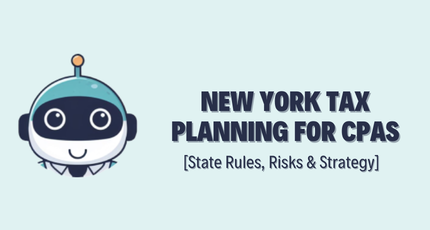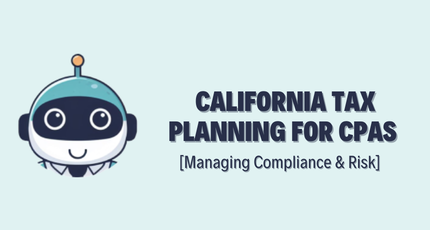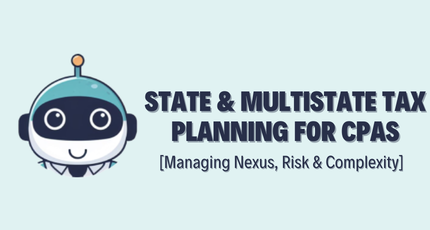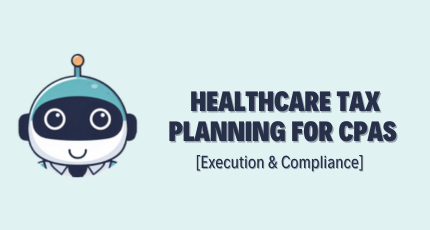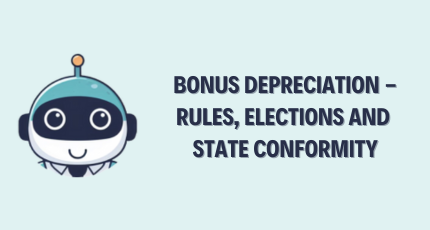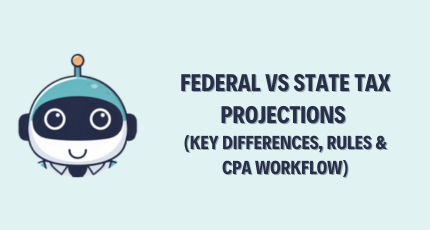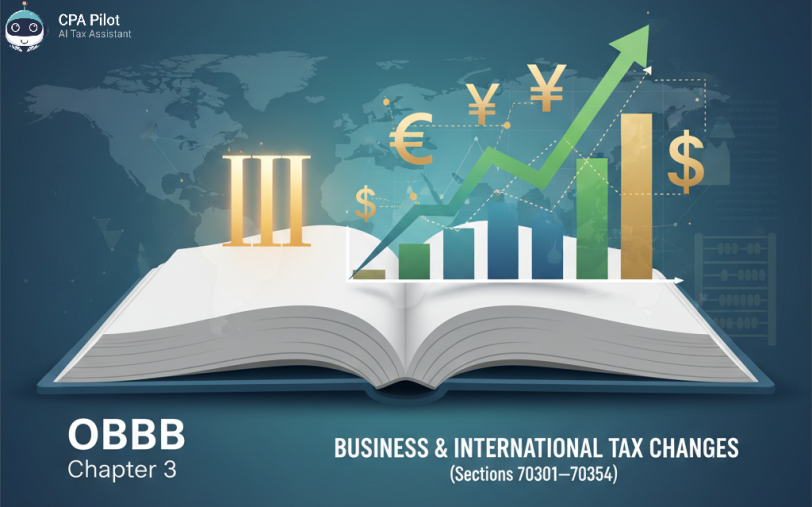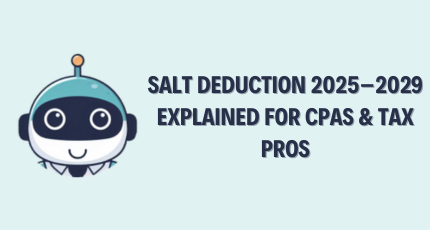One Big Beautiful Bill Act (OBBBA)- Permanent 100% Expensing Returns
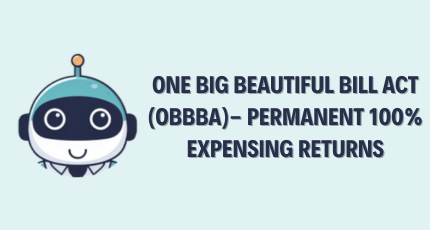
[Last Updated on 3 months ago]
The One Big Beautiful Bill Act (OBBBA), signed on July 4, 2025, permanently restores 100% bonus depreciation for qualified business property placed in service after January 19, 2025.
This landmark legislation reshapes the way CPAs, tax professionals, and business owners plan capital investments, report deductions on Form 4562, and combine §168(k) bonus depreciation with §179 expensing, ending the gradual phase-out initiated by the Tax Cuts and Jobs Act (TCJA).
TL;DR: Key Takeaways From the One Big Beautiful Bill Act (OBBBA)
The One Big Beautiful Bill Act (OBBBA), signed on July 4, 2025 as P.L. 119-21, permanently restores 100% bonus depreciation under IRC §168(k). This reform repeals the TCJA’s phaseout, allowing immediate expensing for machinery, vehicles, real estate improvements, and Qualified Improvement Property (QIP) placed in service after January 19, 2025.
- Permanent 100% Expensing: Full write-offs are back for eligible business property; no phase-down after 2025.
- Section 179 Coordination: Higher limits can now be combined with §168(k) deductions for strategic asset planning.
- Compliance Simplified: All claims require IRS Form 4562; CPA Pilot automates drafting and QIP validation.
- State Variance: Not all states conform — CPA Pilot flags nonconforming jurisdictions automatically.
- For Individuals: OBBBA expands deductions for tips, overtime, and senior credits effective in 2026 filings.
In short, OBBBA transforms U.S. depreciation policy into a permanent, pro-investment framework. CPAs and EAs should update software templates, train staff, and automate compliance workflows by Q4 2025.
💡 Pro Tip: Use CPA Pilot to generate Form 4562 schedules, reconcile §179 and §168(k) deductions, and produce client-ready OBBBA summaries — automatically and audit-ready.
By simplifying CAPEX decisions and expanding property eligibility—including Qualified Improvement Property (QIP)—OBBBA creates major new incentives for business investment and introduces fresh compliance dynamics for CPAs and firms.
Table of Contents
- What is the One Big Beautiful Bill Act (OBBBA) and What Tax Law Changes Does It Make?
- Which Key Provisions in OBBBA Affect Federal Taxes, Credits, and Deductions in 2026?
- 100% Bonus Depreciation Restored — What CPAs Need to Know
- Section 179 vs Bonus Depreciation in 2026
- How Should CPAs Report Bonus Depreciation on Form 4562 Under OBBBA?
- How Does OBBBA Impact Businesses and Industries Using 100% Bonus Depreciation?
- How Do State Tax Conformity Rules Interact With OBBBA’s Federal Depreciation Changes?
- What New Tax Deductions Does OBBBA Introduce for Working Americans and Seniors?
- How Does CPA Pilot Automate and Simplify OBBBA Compliance for CPAs?
- OBBBA FAQs
- OBBBA Signing and Implementation Timeline
What is the One Big Beautiful Bill Act (OBBBA) and What Tax Law Changes Does It Make?
The One Big Beautiful Bill Act (OBBBA), codified as Public Law 119-21 and enacted through H.R. 1 (119th Congress, 2025-2026), restructures multiple tax chapters within the Internal Revenue Code.
- Chapter 1 – Depreciation Provisions: Permanently restores 100% bonus depreciation under IRC §168(k) for property placed in service after January 19, 2025.
- Chapter 2 – Expensing Coordination: Aligns §168(k) with the enhanced §179 expensing limits, allowing combined use for strategic capital planning.
- Chapter 3 – Qualified Property Definitions: Expands eligibility to machinery, vehicles, leasehold, and real estate improvements with ≤20-year recovery periods, including Qualified Improvement Property (QIP).
- Chapter 4 – Reporting and Compliance: Requires all bonus depreciation and expense claims to be filed using IRS Form 4562 for transparent documentation.
- Chapter 5 – Fiscal Policy Intent: Designed to stimulate capital formation, manufacturing growth, and small-business competitiveness by making full expensing permanent.
Lawmakers structured OBBBA to eliminate the Tax Cuts and Jobs Act (TCJA) phase-down schedule and simplify depreciation management for CPAs and firms. Together, these chapters modernize U.S. depreciation policy for long-term business investment.
Which Key Provisions in OBBBA Affect Federal Taxes, Credits, and Deductions in 2026?
- Permanent 100% Bonus Depreciation (§168(k)): For qualified property placed in service after Jan 19, 2025. The TCJA’s phase-down (80%, 60%, etc.) is repealed.
- Enhanced Section 179 Expensing: Higher annual deduction limits, combinable with bonus depreciation, and broader eligibility (includes some real estate improvements).
- Adjusted SALT Deduction Cap: Raises the ceiling for State and Local Tax deductions, especially benefitting pass-through entity owners.
- New Deductions for Individuals: Includes deductions for qualified tip income, overtime pay, auto loan interest; expands credits for seniors and retirees.
- Cross-Act Integration: Aligns with CHIPS and Science Act, Low-Income Housing Credit, and Opportunity Zones for multiplied economic impact.

100% Bonus Depreciation Restored — What CPAs Need to Know
100% Bonus Depreciation Permanently Reinstated: All qualified business property with a recovery period of 20 years or less (machinery, vehicles, QIP) that is placed in service after January 19, 2025, now qualifies for permanent full expensing.
Key Rules & Differences:
| Provision | TCJA (Pre-2025) | OBBBA (Post-2025) |
|---|---|---|
| Deduction Percentage | Phased down to 20% (2027) | Permanent 100% |
| Eligible Property | Tangible assets only | Tangible assets + QIP |
| Expiration | 2027 phase-out | None (Permanent) |
| Section 179 | Limited | Fully combinable |
- CAPEX Planning: Accelerates deductions for purchases with no phase-down worries.
- Financial Reporting: Creates deferred tax assets, may generate NOL carryforwards.
- Automation Need: Firms must update Form 4562 templates and processes.
Section 179 vs Bonus Depreciation in 2026
| Feature | Section 179 Expensing | Bonus Depreciation (§168(k)) |
|---|---|---|
| Deduction Cap | IRS-set annual limit | No dollar cap |
| Eligibility | Tangible property, certain software | Tangible property ≤ 20 years, QIP |
| Flexibility | Partial expensing allowed | Must apply to all unless opt-out |
| Income Limit | Deduction cannot exceed business income | No limit; can create NOLs |
| Use Case | Small/medium purchases | Large-scale CAPEX |
| State Conformity | Some states restrict/decouple | Varies by state |
Strategic Planning: Smart businesses apply Section 179 first (for select smaller assets), then bonus depreciation for what’s left—optimizing cash flow and tax timing.
How Should CPAs Report Bonus Depreciation on Form 4562 Under OBBBA?
- File IRS Form 4562 to report all bonus and Section 179 depreciation claims.
- Part I: Section 179 elections and limits
- Part II: 100% bonus depreciation on qualified property (after Jan 19, 2025)
- Listed Property: Vehicles/mixed-use assets require substantiation
- Permanent rules increase the need for detailed documentation
- State Conformity Warnings: Nonconforming states (CA, NJ, NY, etc.) require separate state schedules
Automation Opportunity:
CPA Pilot instantly populate Form 4562, generate audit memos, and flag state conformity gaps—turning a compliance burden into a workflow asset. Find the best plan now
How Does OBBBA Impact Businesses and Industries Using 100% Bonus Depreciation?
- Manufacturing: Full expensing for machinery and automation improves after-tax ROI, boosts U.S. investment
- Real Estate/Construction: 100% first-year deduction for QIP and leasehold improvements speeds up renovations and retrofits
- Small Businesses: Section 179 paired with bonus depreciation enables immediate full write-offs, dramatically simplifying tax tracking
- Tech/Semiconductors: OBBBA works with CHIPS Act credits to support rapid sector growth
Financially, these changes may create larger initial deductions and NOLs, requiring new planning for deferred tax assets.
How Do State Tax Conformity Rules Interact With OBBBA’s Federal Depreciation Changes?
- Federal: OBBBA restores permanent 100% expensing post-Jan 19, 2025
- State: Most states decouple from IRC §168(k), requiring dual ledgers and compliance systems (notably CA, NJ, NY)
- SALT Cap: Raised federally, but states may slowly align
- Other Federal Acts: OBBBA incentives layer with credits from the CHIPS Act, Opportunity Zones, and Low-Income Housing Tax Credit
- CPA Consideration: Maintain dual tracking and use automation to surface non-conforming state rules
What New Tax Deductions Does OBBBA Introduce for Working Americans and Seniors?
- Deductions:
- Qualified tip income (service sector)
- Overtime pay—partial deduction
- Auto loan interest (for work/business use)
- Senior Benefits: Larger refundable credits, lower medical expense thresholds, and a streamlined 1040-SR filing
- Goal: Offset cost-of-living increases for both wage earners and retirees, simplify compliance for both groups
CPAs must now segment clients for these new credits, updating processes and outreach accordingly.
How Does CPA Pilot Automate and Simplify OBBBA Compliance for CPAs?
CPA Pilot is an AI-driven tax compliance solution tailored for OBBBA-era challenges. Key features:
- Automated Form 4562 creation
- Real-time law and parameter updates (P.L. 119-21)
- Generates client emails, audit documentation, CAPEX reports fast
- Cross-state and multi-asset schedule generation
- Advisory insights for equipment purchasing ROI
Result: CPAs spend less time on tedious calculations and more providing strategic value.
OBBBA FAQs
Can bonus depreciation be claimed for assets acquired via a Section 1031 exchange?
No, bonus depreciation on Section 1031 replacement property is limited to the new tax basis only.
Do luxury automobiles qualify for 100% bonus depreciation under OBBBA?
No, passenger autos have capped bonus depreciation; only vehicles over 6,000 lbs are fully eligible.
How does OBBBA impact cost segregation studies for real estate investors
Yes, OBBBA increases immediate deductions from cost segregation for real estate investors.
When should businesses elect out of bonus depreciation in favor of a slower depreciation method?
Elect out if you want to smooth taxable income, avoid NOLs, or defer deductions.
Is bonus depreciation available for assets partially used for personal activities?
No, mixed-use assets must be used more than 50% for business and require logs to qualify.
How does the Qualified Business Income (QBI) deduction interact with OBBBA’s 100% bonus depreciation?
Under OBBBA, QBI deduction eligibility depends on taxable income after bonus depreciation. Larger deductions under §168(k) reduce QBI because depreciation lowers net qualified business income. AI Tax Assistants like CPA Pilot automates this interaction for accurate 20% deduction planning.
OBBBA Signing and Implementation Timeline
- June 2025: OBBBA passes Congress as fiscal reform centerpiece
- July 4, 2025: Signed into law (P.L. 119-21)
- Jan 19, 2025: Retroactive effective date for 100% expensing
- Late 2025: IRS releases draft guidance, updates Form 4562
- 2026 Tax Season: First filing cycle under new rules
Preparation for Firms:
- Update tax software, templates, and workflows during Q3-Q4 2025
- Train staff and adjust engagement letters before January 2026
- Launch client communications regarding permanent 100% bonus depreciation, new eligibility, and individual credits
Ready to simplify OBBBA compliance for your firm?
With CPA Pilot, you can automatically generate updated Form 4562 reports, model 100% bonus depreciation scenarios, and prepare clients for the 2026 tax season — all within minutes.
Start transforming your tax workflows before January 2026. 👉 Explore CPA Pilot Plans

